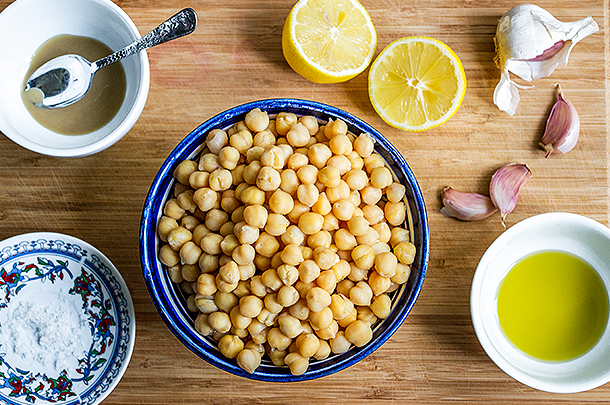When involved in gender psychology and women’s studies, one notices there are certain circumstances which pertain purely to one or other of the sexes. April in Britain, gave rise to such an event which could – with enough reading around the literature – be directly attributed to women experiencing the menopause. This event was, of course, the hummus shortage.
Hummus, being that of Eastern Mediterranean origin, comes in both a variety of spellings, and of forms – however for the purposes of this article, readers are asked to imagine the little chickpea dip which is usually relegated to being served at Bank Holiday barbeques in the centre of a tray surrounded by perfectly trimmed carrots and celery, for easy-access dipping. If you are lucky there will be some pita bread to accompany it, usually warmed and forgotten somewhere in the kitchen, wrapped in a tea towel. Largely now claimed by the British as their own, the flimsy plastic pots of overly puréed, overly sweetened, overly bland chickpea paste is far from the art form it is in its homeland, but hummus – or “houmous” as it is more commercially displayed – has quickly become a great favourite amongst the British populous. “But what does hummus have to do with the menopause?” I hear you ask… Well, for those of you who have indulged in watching ‘Sex and the City 2’, you will remember that Samantha Jones (referred to in the film as “The Hormone Whisperer”) reverts to eating hummus by the spoonful after her forty-four tablets for keeping the menopause at bay are confiscated by United Arab Emirates officials, on landing in Abu Dhabi. She does this, of course, not for her love of the humble chickpea, but rather in a desperate attempt to recharge her body with “natural estrogen”; stave off the menopause for the duration of her stay, and keep her libido on pointe [sic].
Whilst providing ample comic effect to the 2010 film, the character portrayed by the Liverpool-born Kim Cattrall makes a valid point, which when looked at in the scientific literature, has an empirical justification. Two recent studies by Hai-Rong Ma and colleagues look at the potential oestrogenic therapeutic uses of chickpeas, with the first, an in vitro study (Ma et al., 2013a) concluding: “Chickpeas are not only useful as food. They are also a part of traditional Uighur herbal medicine. Isoflavones are the most important chemical components of chickpea seeds and sprouts.” (p.1240) and that: “…chickpea sprout extract may possess estrogenic activity and may be useful as a supplement to HRT and in dietary supplements.” (p.1241). A parallel in vivo study (Ma et al., 2013b) demonstrated isoflavones extracted from chickpea sprouts “…had strong estrogenic activity and it can be used to treat symptoms associated with menopause, restore endocrine function and prevent osteoporosis.”; further providing an empirical rationale “…for the use of ICS to prevent and treat estrogen deficiency-related diseases.” (both p.384).
These small and seemingly inconsequential scientific breakthroughs do, in fact, have huge ramifications on the physical health of menopausal women.
If there could be natural, diet-led, or supplement controlled alternatives to long-term hormone replacement therapies [HRTs], it may offer women of post-childbearing age a safer, non-medicalised way to negotiate the menopause and enjoy later life without being a slave to the constant need for a medical approach to the body’s natural course. The experience of menopause is starkly different in the Western World to that in the Eastern World (Lock, 1995). Hot flushes and night sweats are commonplace in older women in the West, but much less so in the East. The women of the West are also more often heavily medicated for menopausal symptomatology posing potential cause for concern, as McKeon (2002) so eloquently writes: “A number of studies are ongoing, and new information about the benefits and risks of HRT is emerging. Publication of findings from these investigations hopefully will provide answers to some of the unanswered questions. As new data become available, thinking about the benefits and risks of HRT may change, and new recommendations and treatment decisions may be warranted.” (p.26). The risks are high for long-term HRT usage in post-menopausal women, including the possibility of breast cancer (Licznerska & Baer-Dubowska, 2005; Lock, 1995; McKeon, 2002); osteoporosis (Lock, 1995; Ma et al., 2013b; McKeon, 2002); heart disease (Lock, 1995; McKeon, 2002); reportedly among other diseases (McKeon, 2002).
But enough doom and gloom, because the humble little chickpea could very well provide the answer for a more natural approach for post-menopausal women. Diets high in phytoestrogens may just be the way forward. Certainly looking to the East, in China and Japan, where diets are naturally higher in soy (and therefore phytoestrogens), women’s experience of menopause is largely without the strong physiological association giving rise to a culture where there is no vocabulary for the symptomology of the menopause (Scheid, 2007). Of course that may not see the demise of the mass hysteria (yes, [Freudian] pun intended!) in media headlines when the purpose-built chickpea crushing factories fail to produce our favourite Middle-Eastern dip and hummus once again becomes short in supply. Certainly this April’s headlines of the “Hummus Crisis” (Horton & Morley, 2017; Moss, 2017) or the supermarket “shortages” (Blair, 2017; Khomami, 2017) have shown how invested the Great British public are in the future of the chickpea.
However, and more earnestly, with the rise of chronic illness in the later-mid-life woman on the increase, it may be time to invest a little more in this area of natural approaches to women’s health research, rather than reaching to the HRT patch.
Sometimes going back to nature might simply be better than the medical model, but for now, a healthy laugh at the widespread hummus-related news headline drama will be enough to make you feel a whole lot better!
References:
Blair, O. (2017, April 26). Hummus shortage: Sainsbury’s and Marks and Spencer recall product leaving shelves empty. The Independent. Retrieved from http://www.independent.co.uk/.
Horton, H. & Morley, K. (2017, April 25). Hummus crisis hits supermarkets as ‘metallic-tasting’ dip recalled – leaving empty shelves. The Telegraph. Retrieved from http://www.telegraph.co.uk/.
Khomami, N. (2017, April 25). Hummus shortages after shops remove dip from sale over ‘taste issues’. The Guardian. Retrieved from http://www.theguardian.com/uk.
Licznerska, B., & Baer-Dubowska, W. (2005). Controversies over hormone replacement therapy. HRT as a risk factor of breast cancer in postmenopausal women. Acta Poloniae Pharmaceutica – Drug Research, 62(3), 241-247.
Lock, M. (1995). Women, middle age, and menopause in Japan and North America. Women’s Health Issues, 5(2), 74.
Ma, H., Wei, H., Chen, Z., Yang, Y., Wang, Z., Habasi, M., Cao, X., & Asia, H. A. (2013a). The estrogenic activity of isoflavones extracted from chickpea Cicer arietinum L sprouts in vitro. Phytotherapy Research, 27(8), 1237-1242.
Ma, H., Wang, J., Qi, H., Gao, Y., Pang, L., Yang, Y., Wang, Z., Duan, M., Chen, H., Cao, X., & Aisa, H. A. (2013b). Assessment of the estrogenic activities of chickpea (Cicer arietinum L) sprout isoflavone extract in ovariectomized rats. Acta Pharmacologica Sinica, 34(3), 380-386.
McKeon, V. A. (2002). Exploring HRT: Gauging the benefits, risks, and unknowns of hormone replacement therapy. AWHONN: Lifelines, 6(1), 24-31.
Moss, R. (2017, April 25). A hummus shortage crisis has hit the UK, this is not a drill people. Huffpost: Lifestyle. Retrieved from http://www.huffingtonpost.co.uk/.
N.B. Images not my own & belong, respectively, to: the Jamie Oliver, the Martha Stewart; and the Sex and the City, franchises.







